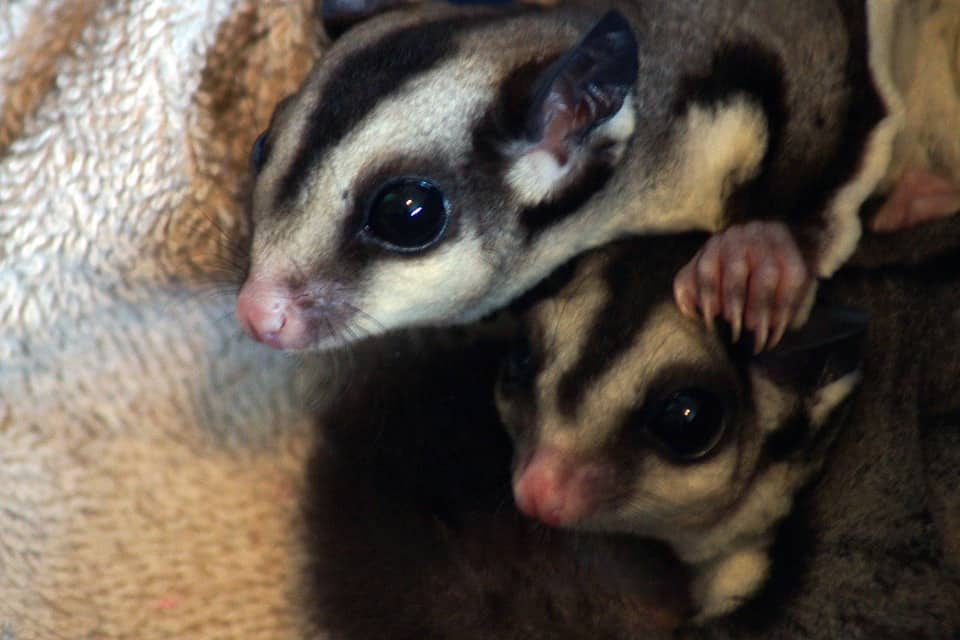Sugar gliders are adorable exotic animals native to the forests of Australia and New Guinea. Due to their adorable appearance and easy to tame nature they’ve become quite popular as pets, with many people adopting them into their homes and taking care of them. Most people know that these tiny marsupials are quite intelligent, but how smart are sugar gliders really? Today, we’re going to find out.
Of course, we can’t exactly ask our gliders to take an IQ test, but there are alternative ways in which we can estimate just how smart these creatures are.

Are sugar gliders smart?
Sugar gliders are relatively smart animals. They’re lively, intelligent, and inquisitive animals that enjoy exploring their surroundings. In addition, sugar gliders are also capable of learning tricks and bonding with their owners. In fact, sugar gliders can even learn their name and come up to their owner when they’re called.
These are definitely signs of intelligence. Less intelligent animals are not capable of such feats, which means that sugar gliders definitely have at least a baseline of intelligence that should not be underestimated.
Just how smart are gliders?

While we know from observing them and anecdotes that sugar gliders are definitely smart animals, they’ve never been observed and studied to determine their exact levels of intelligence. However, when compared to other animals I’d place them somewhere between a rat and a hamster.
Just like rats, sugar gliders are social animals. In the wild, they live in groups of up to 10 adults and their babies. In these groups, they have a relatively complex, strong communal structure with 1 dominant male.
In order to build such social structures, sugar gliders have to be quite intelligent. After all, they have to be able to pick up on social queues such as barking and non-verbal communication. Evidence suggests that being a social animal requires a higher level of intelligence because teamwork requires higher brain capacity.
As such, sugar gliders are more intelligent than hamsters, since hamsters are solitary animals. However, they’re probably less intelligent than rats because rats are among the smartest animals on the planet.
Some people also believe that sugar gliders are on the same level of intelligence as a dog, but there’s no evidence to support that.
Can sugar gliders recognize their owners?
Yes, pet sugar gliders can definitely recognize their owners. After all, if they wouldn’t be able to recognize their owners they wouldn’t be able to form bonds with them.
However, sugar gliders recognize people and other gliders in different ways than we humans recognize other people.
While humans rely mostly on sight, sugar gliders actually rely much more on scent and sound to form bonds. Because of that, sugar gliders respond much more to your scent and the sound of your voice than the sight of you when you’re trying to form a bond with them.
Can sugar gliders learn tricks?

One of the most common ways that people determine the intelligence of animals is their ability to learn tricks because this shows a capacity for learning that other, less intelligent, animals do not have.
Sugar gliders are definitely capable of learning tricks and commands. For instance, you can quite easily teach your sugar glider to stay on top of you while you walk around, and you can even teach them to glide towards you.
Some commands that they can learn are “come”, “no”, or “get down”. Some people also attempt to potty train their gliders, but this does not work out very often because it’s simply not in their nature. Similarly, some people try to teach their gliders to stay awake during the day and sleep at night. This does not work because it goes against their nocturnal nature.
So, while sugar gliders are capable of learning certain commands and tricks, these things have to be within their nature. They’re capable of learning a lot of things, but they have to be within reason!
Final words
Sugar gliders are quite intelligent. These little marsupials fall somewhere between a hamster and a rat in intelligence. Their inquisitive, playful, and social nature means that they’re definitely intelligent. In addition, the fact that they’re capable of learning tricks and commands means that they have at least a certain level of intelligence.
Part of the reason why these little critters are so smart can be explained by their social nature. Science has shown that animals that live in groups tend to be smarter than solitary animals because working together requires more intelligence than living in solitude.
- How Long Do American Eskimo Dogs Live? Important Factors and Care Tips - September 29, 2023
- Do American Bulldogs Need Grooming? Essential Tips and Care Guidelines - September 29, 2023
- Do Bengal Cats Enjoy Playing? Essential Tips for Keeping Them Active - September 29, 2023